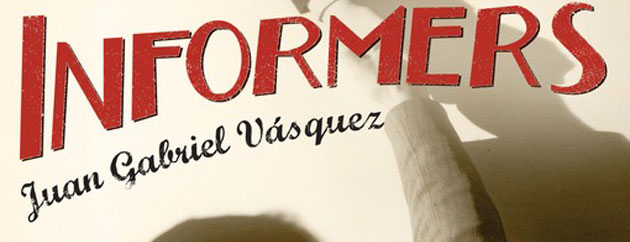
Juan Gabriel Vasquez’s The Informers
11 October, 2012The Informers by Colombian author Juan Gabriel Vasquez is a fascinating book which poses a lot of questions. The story is deceptively simple: a reversal of reputation prompted by a seemingly innocuous book which unravels more than its author can possibly have imagined or intended.
Unforeseen consequences
The narrator, Gabriel Santoro, a young journalist, has written a book “A Life in Exile” which records the life of Sara Guterman, a Jewish woman and friend of the family, who arrived in Colombia in 1938 having escaped with her family from Nazi Germany. What on the face of it seems a well-worn and unexceptional theme soon pivots the story in a totally different direction and casts the journalist’s father (also Gabriel Santoro), an eminent rhetorician who teaches lawyers in the Supreme Court, in an unfavourable light. He in turn, anxious to preserve his reputation, traduces his son’s book in a withering newspaper review.
The blacklist
The can opens and the worms duly emerge. The story goes back to 1941, when the invasion of Pearl Harbour turns Colombia’s tolerance of the Axis powers, in the form of the German expatriate community in the port city of Barranquilla, on its head. A crackdown and blacklisting of German immigrants (at the behest of the US State Department) – some of whom are long settled and integrated – is typically indiscriminate, especially so for the Deresser family who are ruined as a consequence of the collapse of their business and incarceration in the Hotel Sabaneta, Fusagasugá internment camp. All this might be just an unfortunate turn of history but there is more to it than that.
Loose ends
The subject of what happened to the Deressers becomes something of an obsession for Santoro, Jr. There is a disjuncture in the tale; things just don’t add up. Konrad Deresser’s wife leaves him and his son, Enrique, in his 20s, and a close friend of Gabriel Santoro, Sr., seems to disappear without trace. Then there is the matter of the machete attack on the journalist’s father which leaves him with just the thumb on his right hand. Santoro, Sr., confided to Sara Guterman: “I killed the old man, Sara, I fucked up their lives. It’s all my fault.” The ingredients are all there but do they really make sense?
Revelation
The action moves on when Gabriel Santoro, Sr., a widower, convalescing from a heart bypass operation, forms a relationship with his physiotherapist, Angelina. “I’m in no position to make demands,” he says, “if Virgil falls into your life you don’t start cross-examining.” All seems set for a second chance but that’s not what happens. The relationship turns sour on a trip to Medellín, to settle some as yet unspecified business, Gabriel Santoro, Sr., is killed when his car is involved in a collision with a bus. There it might have ended but for one thing. Santoro had confided something to his lover.
The fallout contains more revelations. It transpires that Santoro, Sr., has told Angelina “everything”. When he goes out and doesn’t return she feels spurned. She goes back to Bogotá holding the inflammable knowledge that the great rhetorician, respected and lauded by his country, has a dark secret. She goes on TV and spills the beans. Gabriel Santoro, Jr., believes this to be pique and that she’s merely diverted her personal disenchantment and sense of injustice onto a harmless old man. But has she? He can’t let it rest – he has to get the bottom of it.
Redemption or perdition
The story prompts another book, “The Informers”, where Santoro, Jr., explores Colombia’s wartime past with disturbing results. It’s a story of betrayal; the power of conscience; the distortion of truth; the corrosiveness of hubris and ultimately the need to atone. The character of Sara Guterman says: “Can you imagine if you couldn’t take back what you’ve said?” It’s a rhetorical aside in a story which hangs on a deliberate but unexplained perfidy.
Wilderness of pain
“Memento mori” is a motif writ into the landscape and the text; sometimes in general, sometimes in particular. Gabriel Santoro, Sr., the acerbic pedant and rhetorician, remarks at one point, “40 years in this city [Bogota] where people kill each other out of habit.” There are allusions to historical events. Sara says at one point: “When they killed him [Jorge Eliécer Gaitán, the Liberal presidential candidate assassinated in 1948] we all knew this country would never recover.” Thereafter, the appearance in the text of certain names comes like Stations of the Cross or floral tributes laid at the site of a road accident. Colombia’s political and social landscape is littered with corpses: the assassinations of Rodrigo Lara Bonilla (1984), Jaime Pardo (1987), Luis Carlos Galán (1989), Carlos Pizarro (1990) and Andrés Escobar (1994), the footballer, whose own goal in the 1994 World Cup, led to his becoming a votive offering to the irrational and the indiscriminate murder of civilians in the Los Tres Elefantes (1990) and Centra 93 (1993) bombings in Bogota. These incidents will be familiar to Colombians but less so to others.
Suffice to say, the splendid dust cover attributes aren’t just mindless hyperbole in this instance – they’re actually true. Read it!
Juan Gabriel Vasquez’s The Informers is published by Bloomsbury and be bought from Amazon and other bookstores.
Follow Sounds and Colours: Facebook / Twitter / Instagram / Mixcloud / Soundcloud / Bandcamp
Subscribe to the Sounds and Colours Newsletter for regular updates, news and competitions bringing the best of Latin American culture direct to your Inbox.

